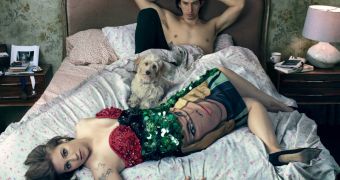Lena Dunham is featured in the latest issue of Vogue magazine, in a gorgeous pictorial by Anne Leibowitz but, if you’re a fan of Lena’s HBO show “Girls,” you might feel tempted to double check the photos, because she looks eerily different than you know her, thanks to a huge helping of Photoshop.
The controversy has been raging since the photos came out, even prompting Jezebel to offer a $10,000 (€7,387) reward for whoever came up with the original photos. That only took a few hours, and a before and after shot (after Photoshop, that is) is also included at the end of the article.
In other photos, like the one attached to this piece, Lena is missing important body parts (like an arm), in someone’s obvious and not very skilled attempt at making her look skinnier and longer-limbed, and having all her so-called “imperfections” (like wrinkles and, oh yes, pores) removed.
Asked by Slate what she thought of the controversy around her Photoshopped pictures, Lena, who has always stood for “beauty comes in all shapes and sizes,” actually defends the practice of retouching photos to this extreme, blaming those who took offense with her spread for not being more open-minded.
She does not directly address the fact that, obviously, those people were her fans, fans who knew very well that she didn’t look like in the photo and who somehow felt deceived by being presented with this “sanitized” version of her.
Neither does she address the ongoing debate about how selling such “fantasies” to an increasingly younger female audience leads to severe body image issues and health problems later in life. Hey, it’s fashion!
“I understand that for people there is a contradiction between what I do and being on the cover of Vogue; but frankly I really don’t know what the photoshopping situation is, I can’t look at myself really objectively in that way. I know that I felt really like Vogue supported me and wanted to put a depiction of me on the cover. I never felt bullied into anything; I felt really happy because they dressed me and styled me in a way that really reflects who I am,” she says.
“And I felt that was very lucky and that all the editors understood my persona, my creativity and who I am. I haven’t been keeping track of all the reactions, but I know some people have been very angry about the cover and that confuses me a little. I don’t understand why, photoshop or no, having a woman who is different than the typical Vogue cover girl, could be a bad thing,” Lena continues.
She then goes on to say that it’s absurd to expect women in fashion magazines to be true depictions of reality because, after all, these publications deal in fantasies.
“A fashion magazine is like a beautiful fantasy. Vogue isn’t the place that we go to look at realistic women, Vogue is the place that we go to look at beautiful clothes and fancy places and escapism and so I feel like if the story reflects me and I happen to be wearing a beautiful Prada dress and surrounded by beautiful men and dogs, what’s the problem? If they want to see what I really look like go watch the show that I make every single week,” Lena counters.


 14 DAY TRIAL //
14 DAY TRIAL //